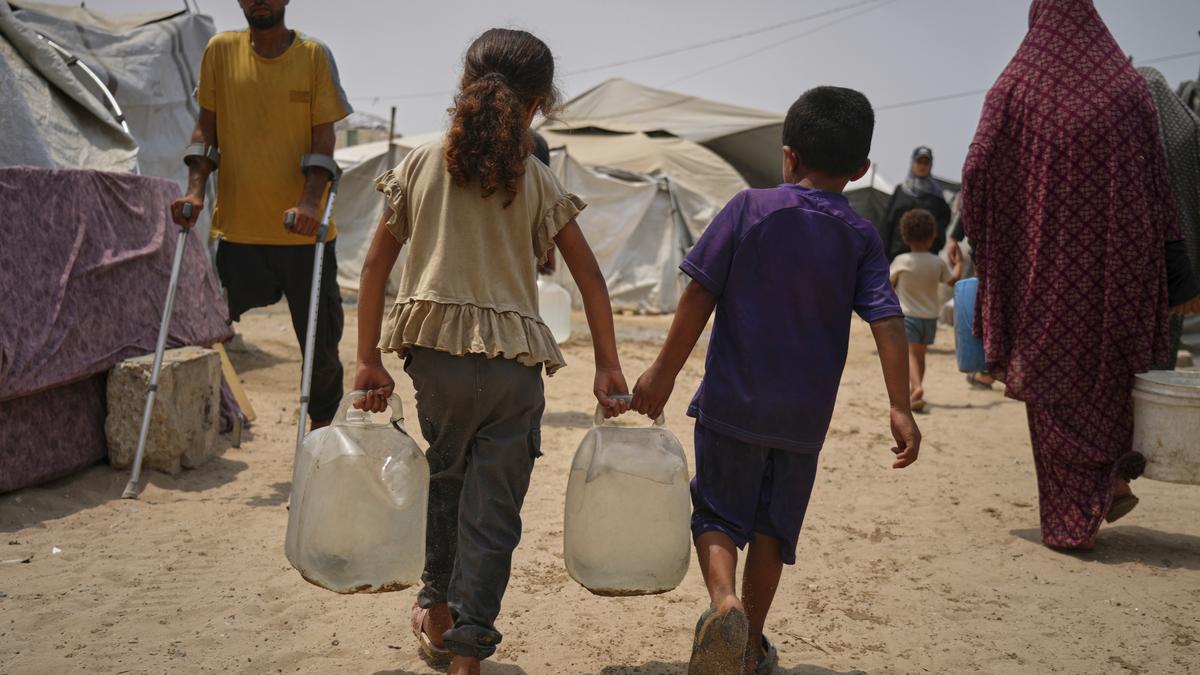Today, I am angry. I am disappointed. I write because my children are dying. Your children are dying. Our children are dying in Gaza. I can hear their cries. I can feel their pain. Why can’t you?
Every day, around 30 children are killed — by bombs, missiles, and deliberate, systemic deprivation. Only two days ago, 83 Palestinians lost their lives in the Gaza Strip. Families are going days without food, leaving their orphaned children behind. Health systems have completely collapsed. Supplies have crumbled. Water is scarce. Fuel is gone. Hope is dying. Starving infants are perishing in their mothers’ arms, while aid trucks sit blocked at borders. This is the gruesome face of a war that has no moral justification.
This is not merely a tragedy — it is a moral apocalypse and a brutal crime against humanity. And the world’s institutions? The UN? Governments? They are failing.
Recent reports from the United Nations have been alarming and frightening. Gaza stands on the brink of a famine. A quarter of the population are already facing famine-like conditions and over 3,20,000 children, the entire population under five, are at risk of acute malnutrition. In Gaza City alone, child malnutrition rate has quadrupled in the last two months.
I am not an expert on the historical conflict between Israel and Palestine, nor a scholar of geopolitics and neither an authority to propose a definitive solution. Certainly, the captivity and killing of innocent Israelis at the outset was unacceptable. But that does not justify the brutal retaliation on Gaza or any violence.
In 2023, when Hamas had held innocent Israelis hostage and a war-like situation had just about begun, I knew that the repercussions would be worse than we could ever imagine. I couldn’t sit back and immediately called my fellow Nobel Laureate friends, reminding them that the call for peace must come from us. On October 30, we 104 Nobel Laureates jointly made an appeal to every single Head of State and urged international organisations and governments to ensure the safety and well-being of all Israeli and Palestinian children. Our call to action undoubtedly had some impact. The international media covered it extensively and it echoed in the political and global discourse for a few months. We were hopeful. But sadly today, leaders are ignoring the grave situation and failing the children.
Transcending borders
The suffering of Gaza’s children transcends borders, ideologies and conflicts. Children bear no responsibility for war. They do not drop bombs or launch rockets. They do not set policies. They hold no historical grievances. So why must they pay the ultimate price for the failures and hatred of adults? Is it their crime to be born in a particular piece of land or into a family of a certain faith? Why should these innocents suffer for the acts, right or wrong, of their ancestors? Why is the lens with which we are viewing people today, and our emotions and judgments so coloured by religious politics?
This is the moment to speak out clearly. We must demand an immediate ceasefire to stop the killing of innocent civilians. Restrictions on food, water, fuel, and medical aid must be lifted immediately. Local food and grocery supply systems, bakeries, farms must be urgently restored and small vendors should be allowed to function without any fear of threats. Aid workers must be protected, never targeted or obstructed. Those weaponising starvation, blocking aid, or denying access to basics needed for survival must be held accountable under international law.
The time for merely expressing concern, hosting seminars, showing sympathy, or issuing press statements is over. We must choose between complicity and compassion. And I mean compassion not as a soft emotion or a feeling, but a transformative force born from feeling the suffering of others as one’s own and taking mindful action to end that suffering. Contrary to popular belief, compassion is not a moral ideal, but a practical and effective strategy for resolving conflicts.
There is a sliver of hope when, last month, the UK, France, and 26 other countries issued a tough statement condemning Israel for depriving Palestinians of “human dignity”. The streets are filled with protesters, shocked and enraged by the scale of violence and trauma being unleashed. Several countries including Australia, France, Turkey, and Tunisia, have held demonstrations in the past few weeks. Other governments must also come together to produce a systematic, comprehensive, and concrete response. The day is not very far when we will realise that power does not lie in firing missiles; power lies in compassion.
The voices of the innumerable young war survivors from Iraq, Afghanistan, and other conflict zones who I have interacted with over the years haunt me. I vividly recall an incident from some years back when I met a 10-year-old wheelchair-bound boy in a Syrian refugee camp in Germany. He had taken shelter along with several other children, women and men, all bearing the scars of war. During our conversation, he told me that he had lost his legs — and his father — in a bomb blast. He was separated from his mother in the chaos that followed. Overcome with grief, I had asked the child what he wants to do in future. I will never forget the conviction in his voice as he replied, “I want to study and become an engineer so that I can go back to my village that was destroyed in the war, and rebuild it.” There was hope in his eyes and his dream was alive.
If we cannot save the children of Gaza from bullets, bombs and the slow death of starvation, how can we ever speak of nurturing their dreams and hopes for the future?
Kailash Satyarthi is the founder of the Satyarthi Movement for Global Compassion; views are personal
Published – August 14, 2025 12:20 am IST
